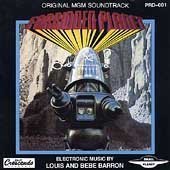| All Artists: Louis Barron, Bebe Barron Title: Forbidden Planet: Original MGM Soundtrack Members Wishing: 5 Total Copies: 0 Label: GNP Crescendo Records Original Release Date: 3/15/1956 Re-Release Date: 9/1/1956 Album Type: Soundtrack Genres: Dance & Electronic, New Age, Pop, Soundtracks Style: Electronica Number of Discs: 1 SwapaCD Credits: 1 UPCs: 052824000124, 182478072120, 0090204872756, 090204085507 |
Search - Louis Barron, Bebe Barron :: Forbidden Planet: Original MGM Soundtrack
 | Louis Barron, Bebe Barron Forbidden Planet: Original MGM Soundtrack Genres: Dance & Electronic, New Age, Pop, Soundtracks
|
Larger Image |
CD Details |
CD ReviewsA prototype Timothy P. Scanlon | Hyattsville, MDUSA | 12/24/2002 (4 out of 5 stars) "This was a clever film, a sci fi rendition of Shakespeare's "The Tempest." A trekkie whom I dated in my single days referred to the film as a prototype of Star Trek. So the film, shot when I was just a boy, was a prototype, in many ways ahead of its time. So, thusly, is the music. While electronics have become a way of life in the "developed" world now--How long has it been since you've heard a phone "ring?"--in the mid 1950s, they were still fantasy. The film works simulataneously at three levels, the interstellar voyage of the characters, the far more advanced technology/prehistory of the Krell, and the subliminal, and very animal, instinctive id. The composers did a clever job of mixing electronic sound effects with a "musical" tone, some later mimicked by a number of minimalist composers, to develop the ambiance of these levels.If you haven't seen the film, maybe that description will entice you to see it. And the soundtrack will remind you of they mystery and intrigue of the story." Powerful electronic score H. F. Gibbard | Dark City, USA | 03/23/2000 (4 out of 5 stars) "I know of only two films that are "haunted" by their film music: Alfred Hitchcock's Vertigo, and this one, Forbidden Planet. By "haunted," I mean that the film music forms an independent subtext about off-screen events, communicated directly to the viewer, which expresses something more profound than the emotions and experiences of the on-screen characters. In this film, the music is used to evoke a dead race, the Krell, that live on in their machines. We never see the Krell, but the ethereal music stands in for them. Listened to separate from the film, this score for Forbidden Planet has a visceral effect on the listener. Some of the tracks are loud and jarring; others lend themselves to quiet meditation. It's not film music in the traditional sense, but it's fun to listen to while the conscious mind is occupied elsewhere, say in reading or working." No theremin used here folks. J. C. Ray | 07/30/2005 (5 out of 5 stars) "Louis & Bebe Baron, pioneers in electronic film music.
It is clearly stated in the album's liner notes that no theremin was used in the creation of this landmark score and with good reason, the artists actually created by hand specialty circuits (in keeping with the basis of cybernetics) to create either individual sounds or sometimes even a huge long circuit board for a complete musical piece, it took them almost a year to do the entire score. Worth owning just for the historical significance but IMO it definitely has a musical flow to it that has artistic merit." |

 Track Listings (23) - Disc #1
Track Listings (23) - Disc #1